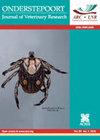Antibiotic Susceptibility of Mycobacteria Isolated from Ornamental Fish
IF 1.6
3区 农林科学
Q2 VETERINARY SCIENCES
引用次数: 4
Abstract
Abstract Introduction Nontuberculous mycobacteria (NTM) are increasingly recognised as causative agents of opportunistic infections in humans for which effective treatment is challenging. There is very little information on the prevalence of NTM drug resistance in Poland. This study was aimed to evaluate the susceptibility to antibiotics of NTM, originally isolated from diseased ornamental fish. Material and Methods A total of 99 isolates were studied, 50 of them rapidly growing mycobacteria (RGM) (among which three-quarters were Mycobacterium chelonae, M. peregrinum, and M. fortuitum and the rest M. neoaurum, M. septicum, M. abscessus, M. mucogenicum, M. salmoniphilum, M saopaulense, and M. senegalense). The other 49 were slowly growing mycobacteria (SGM) isolates (among which only one was M. szulgai and the bulk M. marinum and M. gordonae). Minimum inhibitory concentrations for amikacin (AMK), kanamycin (KAN), tobramycin (TOB), doxycycline (DOX), ciprofloxacin (CIP), clarithromycin (CLR), sulfamethoxazole (SMX), isoniazid (INH) and rifampicin (RMP) were determined. Results The majority of the isolates were susceptible to KAN (95.95%: RGM 46.46% and SGM 49.49%), AMK (94.94%: RGM 45.45% and SGM 49.49%), CLR (83.83%: RGM 36.36% and SGM 47.47%), SMX (79.79%: RGM 30.30% and SMG 49.49%), CIP (65.65%: RGM 24.24% and SGM 41.41%), and DOX (55.55%: RGM 9.06% and SGM 46.46%). The majority were resistant to INH (98.98%: RGM 50.50% and SGM 48.48%) and RMP (96.96%: RGM 50.50% and SGM 46.46%). Conclusion The drug sensitivity of NTM varies from species to species. KAN, AMK, CLR and SMX were the most active against RGM isolates, and these same four plus DOX and CIP were the best drugs against SGM isolates.观赏鱼分枝杆菌的抗生素敏感性研究
摘要介绍非结核分枝杆菌(NTM)越来越被认为是人类机会性感染的病原体,有效的治疗是具有挑战性的。关于波兰NTM耐药流行情况的信息很少。本研究旨在评价NTM对抗生素的敏感性,NTM最初是从患病观赏鱼中分离出来的。材料与方法共分离99株,其中快速生长分枝杆菌50株(其中四分之三为chelonae分枝杆菌、peregrinum分枝杆菌和fortuitum分枝杆菌,其余为neoaurum分枝杆菌、septicum分枝杆菌、脓肿分枝杆菌、mucogenicum分枝杆菌、沙门氏菌分枝杆菌、saopulense分枝杆菌和塞内加尔分枝杆菌)。其余49株为生长缓慢的分枝杆菌(SGM)分离株(其中只有1株为苏氏分枝杆菌,其余为海洋分枝杆菌和戈登分枝杆菌)。测定了阿米卡星(AMK)、卡那霉素(KAN)、妥布霉素(TOB)、多西环素(DOX)、环丙沙星(CIP)、克拉霉素(CLR)、磺胺甲恶唑(SMX)、异烟肼(INH)和利福平(RMP)的最低抑菌浓度。结果大部分菌株对KAN (95.95%: RGM 46.46%和SGM 49.49%)、AMK (94.94%: RGM 45.45%和SGM 49.49%)、CLR (83.83%: RGM 36.36%和SGM 47.47%)、SMX (79.79%: RGM 30.30%和SMG 49.49%)、CIP (65.65%: RGM 24.24%和SGM 41.41%)、DOX (55.55%: RGM 9.06%和SGM 46.46%)敏感。对INH (98.98%: RGM 50.50%, SGM 48.48%)和RMP (96.96%: RGM 50.50%, SGM 46.46%)耐药较多。结论NTM的药敏因种而异。KAN、AMK、CLR和SMX对RGM最有效,而这4种药物加DOX和CIP对SGM最有效。
本文章由计算机程序翻译,如有差异,请以英文原文为准。
求助全文
约1分钟内获得全文
求助全文
来源期刊
CiteScore
4.30
自引率
0.00%
发文量
13
审稿时长
16 weeks
期刊介绍:
The Onderstepoort Journal of Veterinary Research, is the official publication of the Onderstepoort Veterinary Institute. While it considers submissions from any geographic region, its focus is on Africa and the infectious and parasitic diseases and disease vectors that affect livestock and wildlife on the continent.

 求助内容:
求助内容: 应助结果提醒方式:
应助结果提醒方式:


